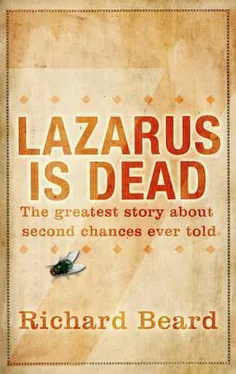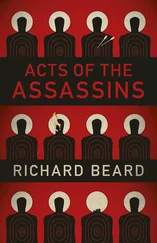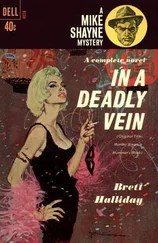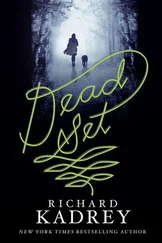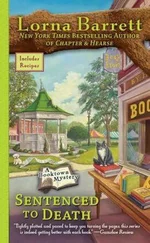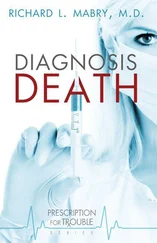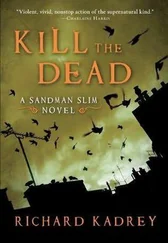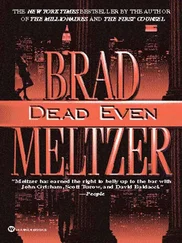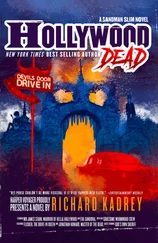Death is horrible and stupid and it can’t be and it is. He curses creation to its face, because god is cruel and god does not exist.
Lazarus lies down on his side, and he knows he is down. He curls up into the shape of his beginning, clutches his skull with his fingers and squeezes. What comes next is the end.
Mary kneels and reaches for his hand. Martha takes the other and he clings on so rigidly they think he’s dead, but it is only panic at a vision of death. He makes one last effort, always more effort.
‘Is there a light?’ Mary asks. ‘Can you see a light?’
Lazarus contorts his lips, struggles to voice a sound. He fails.
His scarred, shaven face flattens against the mat. His reddened eyes are huge in his gleaming skull, and objects directly in front of him present themselves as if for inspection, demanding look at me now for the very last time.
There is a dish of shelled walnuts. They had a walnut tree at the house in Nazareth — but at the end even memories vanish. Poc. Concentrate, look. The flesh of the walnut is the origin of life. Look at its little arms, its foreshortened legs and muscular thighs. It has such telling skin.
How great and varied is the world of things. They too disappear. The bag of dried beans behind the door, poc, and the low table, poc, and the walnuts. Poc. Death is destroying all things on its way to claim him. He stares into the white heat of a flame that sends out halos in every direction.
Poc.
Blackness. Too soon. He releases his sisters’ hands; they hold on tight.
His body has gone, his brain has gone, that’s all he can think, even though he knows the brain lives on if he can think like this. His eyes spring open, see nothing.
Martha sobs bluntly.
Lazarus gives up the fight. He rises above the pit, ignores pain’s message about the importance of staying alive. It doesn’t matter. Millions have come before him, and millions more will follow.
Go on, then. Come on. He finds the courage to move towards the light, towards the darkness. What does it matter.
Lazarus now is dead.
HE SOLD BLEMISHED lambs at the Temple. He cheated shepherds and made compulsive visits to a prostitute. He was insensitive and self-important, he was beloved and he was dead.
There should be exceptions, Martha thinks, individuals with a god-given second chance. Death is unfair.
She and Mary kneel over the corpse of their brother. It is laid out on the newest straw mat they could find, but Lazarus dead is not Lazarus. His face was never that still. Several hours later his beard is growing, like a recrimination.
‘Jesus brought two people back to life,’ Mary says. She is useless at helping with the body. ‘He can’t just leave us like this.’
‘Don’t, Mary. You’re making it worse.’
‘ You’re making it worse. Try harder to believe.’
‘In what?’
‘In something, anything. Believe in Jesus.’ Mary sits back on her heels, eyes and fists squeezed shut. ‘I won’t accept he’s dead until he’s buried.’
Through the first night, Martha watches the body. Lazarus doesn’t change. His fingers and lips are chill to the touch, and there is no exhalation of a departing soul. Lazarus her brother is grey and dead.
More accurately, considering the events of four days from now, he has detached himself from his body. There are conflicting ideas about where he goes next.
The Jewish tradition would have him in Sheol. According to the Book of Enoch (160 BCE), Sheol is guarded by six hundred and sixty-six angels who separate the righteous from the wicked. The wicked are drowned in lakes of fire. ‘You have put me in the depths of the Pit, in the regions dark and deep./ Your wrath lies heavy upon me, and you overwhelm with all your waves …’ (Psalm 88).
The pit. The blazing pain and suffocation. Sheol is recognisable as a version of hell, or the universal experience of the last gasp of life. Lazarus has been through Sheol. He is now somewhere else.
Khalil Gibran ( Lazarus and His Beloved ) pictures him in a better place: ‘there is no weight there, and there is no measure’. Lazarus is in a ‘green pasture’, and by comparison the world we know is a desert.
Others, like the philosopher-novelist Pär Lagerkvist, tell a different story. According to Lagerkvist, Lazarus will later say: ‘ “I have experienced nothing. I have merely been dead. And death is nothing.” ’
Lagerkvist presses for a more satisfactory answer.
‘ “Nothing?” ’
‘ “No. What should it be?” ’
The answer, for those we love, is green pastures and a land without weights and measures. Although ‘nothing’ is also a popular choice, a next-best bet, since second-best is what most of us recognise from life. Death is nothing (which may be better than hell), and therefore nothing to fear.
However, it seems unlikely that Lazarus could have survived nothing. Nothing can come out of nothing, whereas his and other stories have come back about death. After death there is something, and this is where Lazarus is now. It is not the life we know but also it is not nothing.
Which is of little immediate consolation to Martha.
On the second day the growing smell of corpse overtakes the fading smell of sickness.
‘The time may not be right,’ Mary says. ‘Jesus must have a reason.’
Martha slaps her face. Mary puts her hand to her cheek. Outside, the wailers wail.
ON THE SECOND evening is the funeral procession. Lazarus is lifted onto a litter called a dargash , and his body is carried head-high as far as the tomb. He is placed carefully in the upper chamber, and left with his sisters who will prepare him for burial.
It is a Thursday.
Eight days from now, the burial of Jesus will follow a similar basic procedure, and will require the same extravagance of spices: ‘a mixture of myrrh and aloes, about seventy-five pounds. Taking Jesus’s body, the two of them wrapped it, with the spices, in strips of linen. This was in accordance with Jewish burial customs’ (John 19: 39–40).
Martha first washes the body. Her brother has lost his soul. He is soulless, stiffened meat and cold bones, and Martha bites her lips as she completes the ritual practices not reported in the later burial of Jesus. She binds shut her brother’s jaw, tying it closed with a strip of linen wrapped several times round his head. She binds his bloodless lips, the texture of overboiled fish.
‘Mary, do something useful. Mix the spices, prepare the linen, anything.’
Mary kneels and prays. There is no money for burial clothes, so Martha is using the betrothal gown. She rips it into strips, one long tear after another. She has spent the last of their savings on the wailers and the dargash and the spices, more myrrh than aloe because myrrh is slightly cheaper.
‘We have a flask of nard left over,’ Mary says. ‘We could add that to the bandages.’
‘It’s worth three hundred shekels.’
Mary’s lip quivers. Martha looks up from wrapping her brother’s fingers.
‘I’m sorry. I shouldn’t have hit you. I’m sorry.’
They work together, soaking strips of linen in the spices mixed with oil. Then they pack the remaining myrrh and aloe against the body and between each new strip of cloth. Seventy-five pounds is a huge amount of spice. Lazarus’s body will not smell, except of myrrh and aloes, for a very long time.
They arrange his arms down the sides of his body, and bind them tightly. Mary shies away from strapping his knees, his ankles: it is too final a gesture, too utterly hopeless. Besides, they’ve run out of linen.
Читать дальше
